Ever faced the challenge of handling a loved one’s property after they passed away without a will? Or wondered if going through probate is really necessary, or if there’s an easier way to name the legal heirs? If so, you’re not alone.
In the USA, families often face a choice: Affidavit of Heirship vs Probate, should they hire a probate lawyer and follow the court process, or use an affidavit of heirship in Texas to show who the rightful heirs are quickly? Both options have legal standing, but the differences can be confusing, especially when it comes to cost, time, and complexity.
With remote online notarization in Texas, even notarizing an heirship affidavit has become easier than ever. But before you decide, it’s important to understand precisely what an affidavit of heirship is, how it differs from probate, and which approach suits your situation best.
In this blog, we’ll break down the key differences between an affidavit of heirship and probate.
What Is an Affidavit of Heirship?
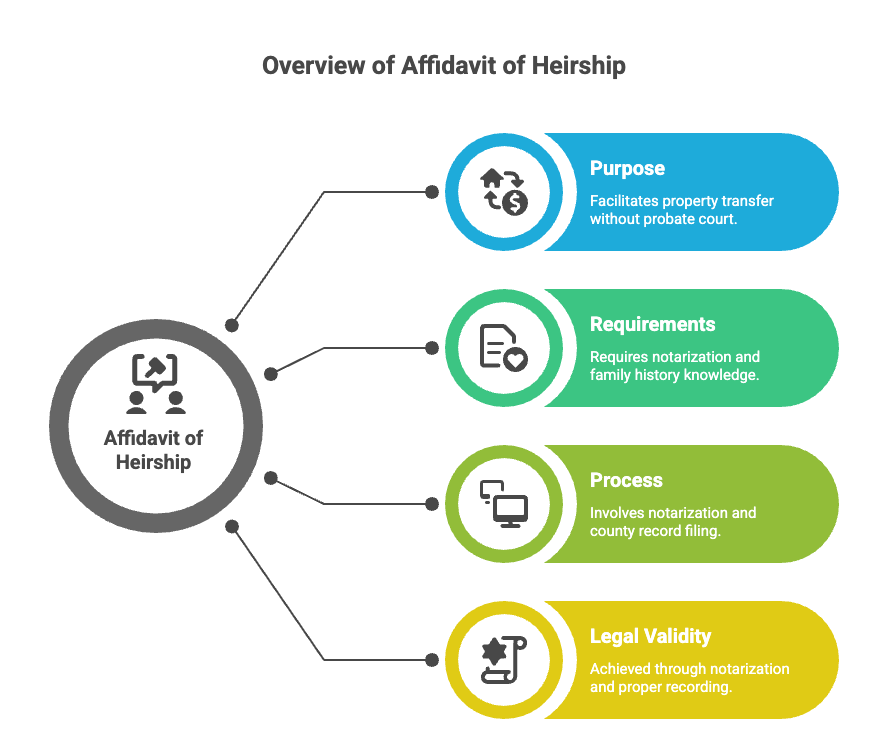
An affidavit of heirship is a sworn legal document used to establish the rightful heirs of someone who died without a will. Commonly referred to as an heirship affidavit, it helps transfer property, usually real estate, without going through probate court.
Key points
- Based on knowledge of close relatives and family history
- Requires a notarized affidavit for legal validity
- Can be done via remote online notarization in Texas or using an online notary
- Recorded in county records to establish property ownership
Bonus Tip – If you’re searching for a public notary near me, platforms like eNotary On Call provide secure remote online notary services to notarize your affidavit quickly.
What Is Probate?
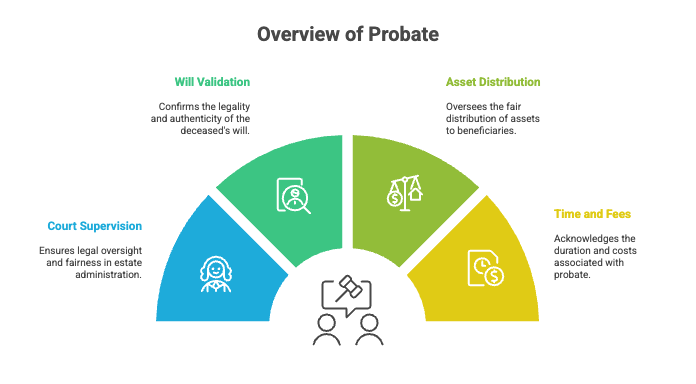
Probate is the legal process by which a deceased person’s estate is administered and distributed under court supervision.
A will probate attorney near me can guide you through this process, which is often required when a will exists or when complex estate matters arise.
Key aspects of probate
- Court-supervised process
- Validates the will and supervises asset distribution
- It can be time-consuming and involve legal fees
Is Probate Compulsory for a Will?
Not always. Certain small estates or assets with named beneficiaries may not require probate.
When Probate Is Mandatory vs. Optional?
When Probate Is Mandatory:
- There’s a valid will and significant assets
- Disputes among heirs arise
- Real estate titles require court verification
When Probate Is Not Mandatory:
- The deceased had no real estate
- Small estates under Texas thresholds
- Assets are jointly owned or have designated beneficiaries
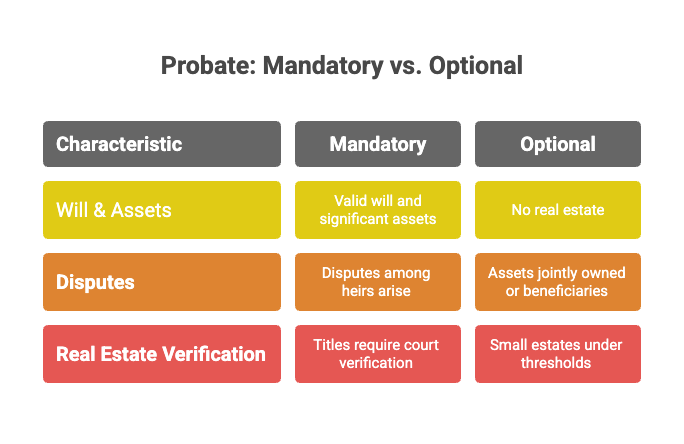
This is where an affidavit of heirship for Texas becomes useful.
Affidavit of Heirship vs. Probate: Key Differences!
| Features | Affidavit of Heirship | Probate |
| Court Involvement | Not Required | Required |
| Cost | Low | Higher, includes legal fees |
| Time | Quick | Several months or more |
| Use Case | Dying intestate, simple estates | Wills, complex estates, disputes |
| Notarization | Required (Notarized Affidavit) | Filling with court, may require notarization |
Example – If a property owner passes away without a will, an affidavit of heirship form Texas can establish heirs efficiently. However, if there’s a contested will, probate is necessary.
Also read – Avoiding Rejection: Top Mistakes in Online Affidavit Notarization. Click Here!
How Remote Online Notarization Simplifies the Process?
Using a remote online notary makes preparing an affidavit of heirship in Texas simple:
- Upload the affidavit of heirship form Texas to a secure RON platform
- Verify your identity online
- Meet a certified notary via video call
- Receive a notarized affidavit instantly
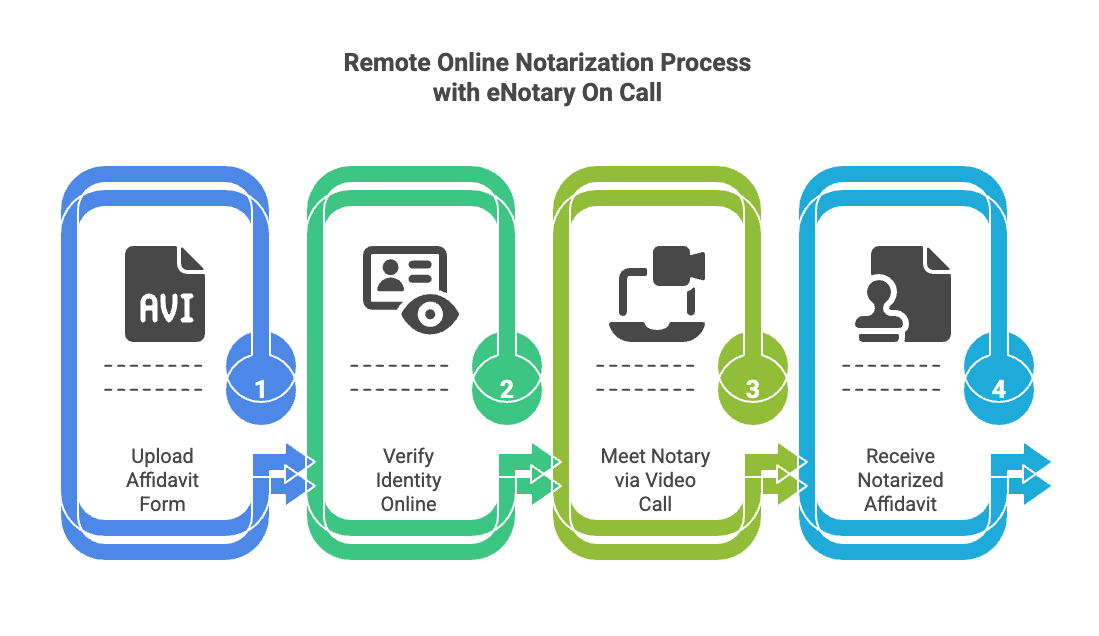
Benefits:
- No need to search for a public notary near me
- Safe, legal, and valid in Texas
- Faster than scheduling in-person notarizations
Some other factors
- Affidavit of Heirship – Best for simple estates without a will
- Probate – Necessary for complex estates, disputes, or validating a will
- Keep in mind that probate records are public, whereas an affidavit of heirship is recorded in county property records for title clarity
- Using the best online notary service ensures compliance with Texas laws
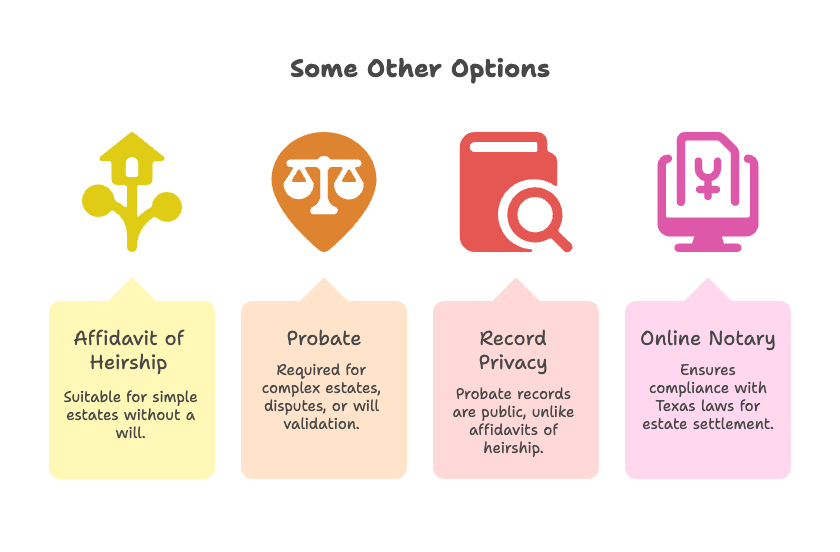
Conclusion
Both affidavit of heirship Texas and probate have their place. For straightforward estates without a will, an heirship affidavit notarized via remote online notarization in Texas can save time and money. For complex estates or disputes, a probate attorney near me is necessary.
Using trusted online notary platforms like eNotary On Call ensures your documents are legally valid, secure, and convenient.
Need a Notarized Affidavit of Heirship?
Visit eNotary On Call and complete your remote online notary session in minutes, from anywhere in Texas.
Also Read – Types of Affidavits You Can Notarize Online Using eNotary On Call! Click Here!
FAQs
Q1. What is an affidavit of heirship?
It’s a legal document identifying heirs of someone who died intestate, helping to transfer property without probate.
Q2. Can I do my own affidavit of heirship in Texas?
Yes, but it must be factual, sworn, and notarized for legal validity.
Q3. What is probate?
Probate is the court-supervised process of validating a will and distributing the deceased’s estate.
Q4. Are probate records public?
Yes, probate records are typically public and can be accessed for verification.
Q5. Is probate required if there is a will?
Not always. Small estates or assets with named beneficiaries may bypass probate, but legal guidance is recommended.



